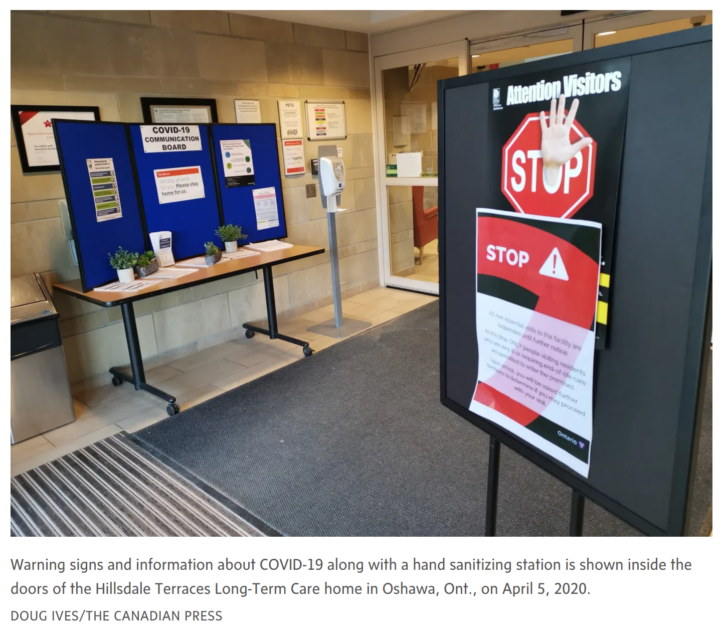Fewer than a dozen nursing homes needed staffing help from the Ontario government on Monday as the deadline for workers to get a first COVID-19 vaccine dose came due, according to the Minister of Long-Term Care.
“We are working closely with any facilities that have been in touch with us,” Rod Phillips said at a news conference in Mississauga.
“There’s a little under a dozen facilities, most of them are in rural communities where there are some challenges, making sure that they have the support that they need. But this was an important step.”
Staff in the province’s 626 long-term care homes were required to have their first COVID-19 vaccine dose to go to work Monday, or show proof of a medical exemption.
The government said 98 per cent of workers had received a first shot as of Monday. Data from the Ministry of Long-Term Care showed 17 homes had a first-dose staff vaccination rate lower than 90 per cent.
A spokeswoman for the ministry said as of Oct. 31, 2,573 staff, student placements and volunteers across Ontario’s long-term care homes were unvaccinated. That number that includes 159 people with provided medical exemptions to vaccination.
Mr. Phillips said the province was working with public health and other partners to ensure homes are property staffed. He also credited the advanced notice for the vaccine mandate, announced last month, and work of operators helped keep the situation under control.
“We haven’t experienced significant issues at this point but we’ll continue to work and make sure that people are safe,” he said.
“And of course, residents and family members can feel much better now, knowing that the vaccination rate level is what it is.”
Monday had initially been set as the deadline for workers to be fully vaccinated against the virus but the Ministry of Long-Term Care pushed that date to Dec. 13.

Mr. Phillips said it was done to accommodate new guidance on vaccine dose intervals from the National Advisory Committee on Immunization, which said eight weeks is the “optimal” interval between doses.
The two-shot Pfizer-BioNTech and Moderna vaccines have been authorized in Canada to be administered at three-week and four-week intervals, respectively.
NACI’s advice on optimal doses noted that factors such as risk, local transmission and the need for a faster second dose should be considered when extending the time between doses.
Mr. Phillips maintained on Monday that the extended deadline was justified, saying the government wanted to ensure people getting the vaccine could follow the advice of medical experts.
He also noted that only one long-term care home was experiencing an outbreak at the time.
Another outbreak was declared at a long-term care home in Sturgeon Falls, Ont., later in the day, with the local public-health unit saying two people had tested positive as of Monday.
The chief executive officer of the Ontario Long-Term Care Association said the policy had largely gone smoothly because the majority of operators mandated vaccines for staff before the government did.
“We’ve been really encouraged at the success of the mandated vaccines overall,” Donna Duncan said in an interview.
She said the extension until Dec. 13 for full vaccination will be helpful for operators still trying to increase their vaccination rates, and to encourage people who aren’t yet immunized to get their shots.
“They’re not writing them off yet,” she said.
Lisa Levin, CEO of AdvantAge Ontario, which covers non-profit and municipally owned homes, said her organization supports the policy but has concerns about staffing issues, “particularly in northern Ontario, where the impact is significant in some situations.”
Opposition politicians said more should be done to support long-term care workers.
New Democrat Leader Andrea Horwath called for higher wages in the sector so it’s easier to replace workers who may be forced to leave if they don’t get vaccinated.
Liberal House Leader John Fraser said the Progressive Conservative government waited too long to enact the mandate and help workers prepare for it, and full vaccination coverage has lagged as a result.
“Now we have a situation where there are some homes where, quite frankly, there’s some risk,” Mr. Fraser said.
Premier Doug Ford’s government has resisted mandating vaccines for workers in most sectors. Mr. Ford decided last month not to require the shots for hospital workers, citing concern over staff losses.
Mr. Phillips said Monday that long-term care is a unique situation because the residents are so vulnerable to the virus, and said the government will continue to look at data around the issue.
Ontario’s seven-day average for new COVID-19 infections has been steadily rising in recent weeks.
The province reported 552 new cases and three deaths from the virus on Monday.
Article From: Globe and Mail
Author:THE CANADIAN PRESS

